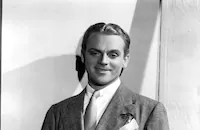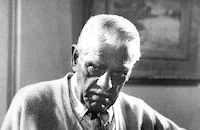Smart Money

Brief Synopsis
Cast & Crew
Alfred E. Green
Edward G. Robinson
James Cagney
Evalyn Knapp
Ralf Harolde
Noel Francis
Film Details
Technical Specs

Synopsis
Nick Venezelos, a Greek barber in a small town, is a lucky gambler who has a weakness for blondes. He has such a lucky reputation that his customers pool their resources to send him to a big poker game in the city. There, he is taken in by crooked gamblers and a deceptive blonde and loses his bankroll. He returns to barbering until he acquires a new bankroll. With the new money, he defeats the crooks, and soon his barber shop is a front for a successful gambling club. Despite the fact that he runs an honest game, the district attorney decides to put him out of business. After forcing Irene, a young woman befriended by Nick after she tried to commit suicide, to frame him in order to avoid being arrested for blackmail herself, the police arrest Nick. Prior to the arrest, Jack, Nick's friend from home, accuses Irene of framing Nick, and during the following fight, Nick accidentally kills Jack. The district attorney sends Nick to jail for manslaughter, but Nick, who is never down for long, bets the reporters that he will be out of jail before his sentence is up.

Director
Alfred E. Green
Cast

Edward G. Robinson

James Cagney

Evalyn Knapp

Ralf Harolde

Noel Francis

Margaret Livingston
Maurice Black
William House
Paul Porcasi
Gladys Lloyd
Polly Walters

Boris Karloff
Morgan Wallace
Clark Burroughs
Edwin Argus

Mae Madison
Walter Percival
John Larkin
Ben Taggart
Billy House

Charles Lane
Edward Hearn

Eddie Kane
Clinton Rosemond
Eulalie Jensen
Wallace Macdonald
Charles O'malley
Gus Leonard

John George
Larry Mcgrath
Spencer Bell
Crew

Videos
Movie Clip



Film Details
Technical Specs

Award Nominations
Best Writing, Screenplay
Articles
Smart Money
The story for Smart Money (nominated for an Oscar) offered a refreshing change of pace in the popular underworld crime genre. By toning down the violence and beefing up the humor, Warners hit on a winning formula and gave its stars plenty of range to display their acting chops. Robinson is a small-town barber with a penchant for gambling, booze, and women. Aided by sidekick Cagney, he runs an illegal gambling den in the back room of his shop, where one day he easily beats a cheating gambler - bit-player Boris Karloff, who would soon get his big break with Frankenstein (1931). Amazed by Robinson's luck and skill, Cagney and friends raise $10,000 to stake him in a big-time syndicate poker game in the city. When he arrives in the city, he meets an attractive young woman who steers him to a game he doesn't realize is a set-up. He loses everything and swears to get even. He sends for Cagney; they get barber jobs in the city and plot their revenge scheme. Parlaying wins at horses and cards into big money, Robinson sets up his own big gambling den, beats the man who cheated him out of the $10,000, and steals the scheming girl from him. (This being pre-Code Hollywood, she ends up living with him.) But complications arise in the form of another woman, a beautiful blonde he saves from suicide. He falls hard for her and is soon planning marriage, but Cagney suspects she's an operative from the district attorney's office. Spotting her planting evidence to incriminate Robinson, he gets into a fight with her (an early instance of the on-screen brutality toward women he would bring to classic status with the grapefruit in Mae Clarke's face in The Public Enemy). Robinson walks in on the fracas and...well, we can't tell you the outcome except it's not what you'd expect.
Romanian-born Edward G. Robinson came from varied and acclaimed work on Broadway in parts ranging from Mexican hero Porfirio Diaz to the epileptic in The Brothers Karamazov to his first starring role - and the only gangster he ever played on stage - in the 1927 sensation The Racket. A small man with the look of a bulldog, he was an unlikely candidate for movie stardom. In its review of Smart Money, Time described him as "an actor with the face of a depraved cherub and a voice which makes everything he says seem violently profane." Nevertheless, he was hugely popular with audiences of the time. But even after rave notices and big box office for Little Caesar, Robinson himself wasn't convinced of his up-and-coming status until he was sent by the studio to the premiere of Smart Money at the Winter Garden Theater in New York. When he found himself hiding on the floor of a limo to avoid the crowds of overzealous fans, his stardom was confirmed.
In his theater years in the 1920s, Robinson met and married a young actress, Gladys Lloyd. She appears in a small part in Smart Money as a cigar-stand clerk. The two made four other movies together, including Little Caesar and his next picture after this, Five-Star Final (1931). She made only one movie without him, an uncredited bit in Clive of India (1935), before retiring. The couple was divorced in 1956.
Although his part was secondary to Robinson's, Cagney very quickly equaled his co-star's popularity. He got star billing for the first time in his next picture, Blonde Crazy (1931), as a con man in another of Warners' fast-talking, hard-edged crime pictures. Over the next decade, the studio led the field in this type of movie. Paramount had its sophisticated Eurocentric comedies, Fox its homespun Americana, MGM the high-gloss glamour of Crawford, Gable, and Garbo. But Warners became best known for its working-class urban tales, usually set in a seedy world of crooks, call girls, and corruption, turning out one movie after another with characters like the ones in Smart Money: Sport Williams, Back-to-Back Schultz, Snake Eyes, Sleepy Sam. And Cagney and Robinson, with their indelible images of inner-city ambition and pugnacity, were the kings of the genre.
Producer/Director: Alfred E. Green
Screenplay: Kubec Glasmon, John Bright, Lucien Hubbard, Joseph Jackson, based on the story "The Idol" by Jackson and Hubbard
Cinematography: Robert Kurrle
Editing: Jack Killifer
Art Direction: Robert M. Haas
Principal Cast: Edward G. Robinson (Nick the Barber), James Cagney (Jack), Evalyn Knapp (Irene), Noel Francis (Marie), Boris Karloff (Sport Williams), Ralf Harolde (Sleepy Sam).
. BW-82m. Closed captioning.
by Rob Nixon

Smart Money
Quotes
Trivia
Notes
Hubbard and Jackson received an Academy Award nomination for Best Original Story. Gladys Lloyd, who played the role of the cigar stand clerk, was the wife of Edward G. Robinson from the mid-1920s through 1956. Smart Money marked the feature film debut of prominent character actor Charles Lane (1905-2007). The bespectacled, aquiline-nosed Lane, who also acted under the name Charles Levinson Lane and Charles Levison, most often played curmudgeons, appearing in more than two hundred feature films and scores of television programs.














